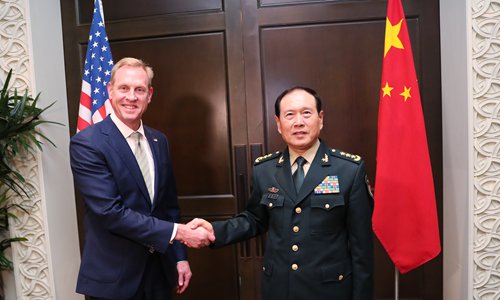
Chinese State Councilor and Minister of National Defense Wei Fenghe (right) shakes hands with Acting US Defense Secretary Patrick Shanahan during a meeting on the sidelines of the 18th International Institute for Strategic Studies (IISS) Shangri-la Dialogue, an annual defense and security forum in Asia, in Singapore on Friday. Photo: Courtesy of China's Ministry of National Defense
Chinese State Councilor and Minister of National Defense Wei Fenghe and Acting US Defense Secretary Patrick Shanahan had a short but "constructive" meeting on Friday during the 2019 Shangri-La Dialogue in Singapore.
This is the first time for China's defense chief to attend the Dialogue in eight years, and the meeting has attracted wide attention as the world keeps a close eye on how the world's most influential powers would interact at the security event.
Both sides agreed that their meeting was positive and constructive and that military ties between the two should be promoted to be a stabilizer of China-US relations, Chinese Ministry of National Defense spokesperson Wu Qian told reporters on Friday.
Though the meeting did not last long, both sides were satisfied and expressed willingness for further communications and exchanges, said Wu.
During the meeting, Wei stressed affairs related to the island of Taiwan, saying China resolutely opposes the recent "negative" words and deeds from the US on such affairs and that the US should never underestimate the Chinese military's determination and capability to safeguard national sovereignty and territorial integrity, Wu said.
Chinese analysts warned that Shanahan is unlikely to tone down regarding China on issues like the South China Sea and affairs related to the island of Taiwan in his Saturday speech for the event.
Reuters reported Shanahan said on Friday that Chinese "militarization" of the South China Sea was "excessive" and that he would be calling out such Chinese actions in a speech on Saturday.
However, Chinese analysts point out that such accusations are groundless. The South China Sea situation is gradually easing as China is improving relations with countries such as the Philippines. It is actually the US instigation that has caused uncertainty in the region.
China will have no choice but to repudiate if Shanahan makes malicious attacks and groundless accusations on issues affecting China's core interests in his speech, He Lei, former deputy head of the Academy of Military Sciences of the People's Liberation Army (PLA) and lieutenant general in the PLA, told reporters on Friday.
He Lei also told reporters that the annual Dialogue is a multilateral security and defense platform organized and dominated by the West. "Over the years, the gathering has almost become a platform which allows the West to spread the so-called China threat theory and to point an accusing finger at China."
The Chinese military has to win the battle not only in real war, but also in the battleground of public opinion, said He.
Sending senior Chinese military officials and observers to the event in the past years has helped the international community understand China in a more objective and fair manner, said Chinese analysts.
As tensions between China and the US mount, worldwide attention is focused on interactions between China and the US at the annual defense summit.
Observers attending the forum share the same feeling. "China" and "US" were the most frequent words heard at the Shangri-La Hotel Friday.
"It is important for both sides not to mix their military relationship with the trade war, the tech war and all other differences," a German observer, who requested anonymity, told the Global Times on the sidelines of the dialogue.
"The frequency of military meetings between the two sides was disrupted in the past years. Some visits were canceled and there were some incidents at sea, but it would be very alarming if they did not meet on the sidelines of this dialogue," said the observer.
Not taking sides
The US is talking openly about containing China, and those who consider China positively are marginalized, Singaporean Prime Minister Lee Hsien Loong said in a keynote speech Friday night.
China's development and success has benefited the world, said Lee. The rest of the world has to adjust to China's larger role. It will continue to grow and strengthen. It's neither possible nor wise to prevent this from happening, said Lee.
When asked how small countries can avoid taking sides, Lee said that "we do our best to maintain our relationship with both." But it also requires limited pressure for them to take sides, he said.
China is growing, and other countries must adjust. Then you have to discuss specific issues like trade, one by one. There is no magic solution, Lee said.
Liu Weidong, a research fellow at the Chinese Academy of Social Sciences' Institute of American Studies, told the Global Times that although US President Donald Trump has not explicitly asked other nations to choose a side, he has threatened them to do so by putting pressure on them.
Huawei's case is an example. The US demanded that other countries follow its lead. Otherwise, sanctions could follow, said Liu.
Ge Hongliang, director of the China-ASEAN Maritime Security Studies Center in Guangxi University for Nationalities, said smaller countries used to be very experienced in striking a balance between major powers.
But today, they face profound geopolitical changes, said Ge.
If Trump forces them to take sides, the pressure will be unprecedented, Ge noted.
Officially known as the Asia Security Summit, the Shangri-La Dialogue has been organized and convened annually by the British think tank International Institute for Strategic Studies and the Singaporean government since 2002.
Senior officials, defense representatives and experts from countries like China, India, the United States, France, Germany, Britain, Japan and Australia will speak at the event.
